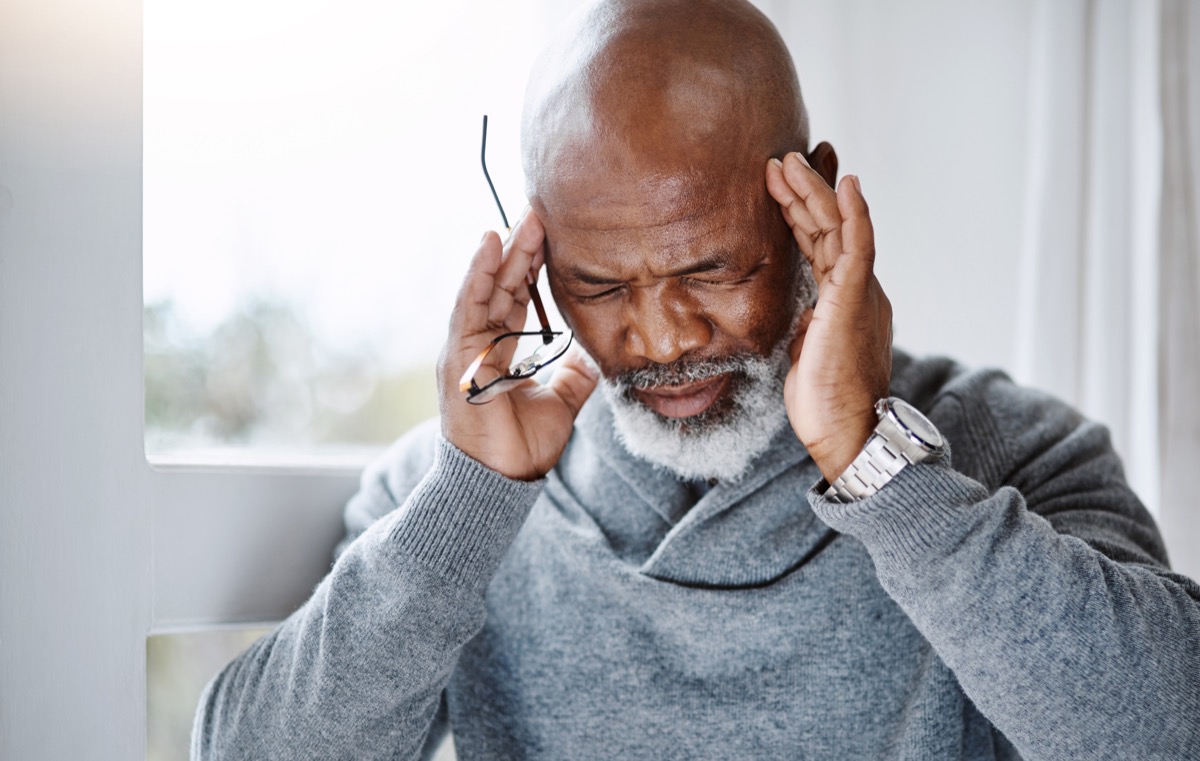But how can you distinguish between a regular, run-of-the-mill headache and something COVID-related? While doctors are still looking into a COVID headache’s distinguishing features, one recent study published in The Journal of Headache and Pain shed some light on the subject. The researchers out of Istanbul University in Turkey surveyed 3,196 patients without COVID and 262 patients with a confirmed COVID diagnosis about their symptoms. They found that there are five key signs that your headache is the result of COVID, as opposed to another illness, stress, or migraine. Read on for the full list, and for more ways to determine if your symptoms are COVID-related, check out This Is How to Tell If Your Cough Is COVID, Doctors Say. Read the original article on Best Life. Many people will describe a headache as “throbbing” when they really just mean it hurts. But true “throbbing headaches” actually include a pulsing, beating sensation, which researchers have noticed are disproportionately associated with COVID-19. According to the researchers, COVID headaches “showed different characteristics like pulsating, pressing, and even stabbing quality.” Milder headaches were less frequently associated with the virus. And for more on spotting signs of coronavirus, check out If You Have These 2 Subtle Symptoms, There’s a Good Chance You Have COVID. The same study found that headaches that persist for at least 72 hours are more likely to be the result of COVID than those that resolve sooner: Over 10 percent of COVID-positive respondents reported this minimum duration, compared with four percent of patients whose headaches were not related to COVID.ae0fcc31ae342fd3a1346ebb1f342fcb Those with coronavirus may also experience shorter tension headaches throughout their sickness, but these are typically associated with the physical strain of severe coughing. And for another symptom to be aware of, check out This Strange Pain Could Be the First Sign You Have COVID, Study Says. Though headaches sometimes present as one of the earliest symptoms of coronavirus, there are two other types of symptoms that often follow suit. “COVID-19 related headaches were more closely associated with anosmia/ageusia [the medical terms for the loss of one’s sense of smell and taste] and gastrointestinal complaints,” the study explains. If you notice that your headache is paired with even mild iterations of these symptoms, it’s definitely time to get a COVID test. And to decode your gastrointestinal issues, check out This Is How to Tell If Your Upset Stomach Is COVID, Doctors Say. Sometimes even a COVID headache will respond to painkillers like aspirin and acetaminophen. However, the research team noted a link between headaches that resist the effects of analgesic medication and a COVID diagnosis. If your headache persists despite over the counter treatment, it could be an early sign of coronavirus. And for more regular COVID news delivered right to your inbox, sign up for our daily newsletter. Yes, this is a broad category, but the study found that COVID-positive men were twice as likely to report headaches than COVID-positive women. “In the COVID-19 positive group, the rate of males [reporting headaches] was 48.1 percent (126 out of 262 patients), whereas in the COVID-19 negative group this rate was 31 percent (991 out of 3196 participants), showing a significant gender difference,” the researchers wrote. And when you need to know if your congestion means something more, This Is How to Know If Your Stuffy Nose Could Be COVID.

